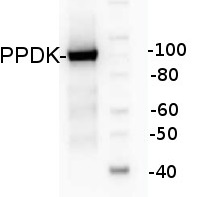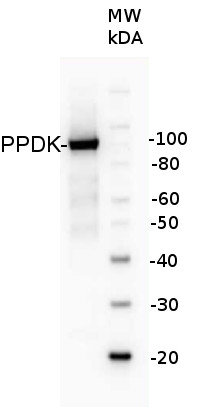1

Anti-PPDK | Pyruvate orthophosphate dikinase
AS13 2647 | Clonality: Polyclonal | Host: Rabbit | Reactivity: Arabidopsis thaliana, Oryza sativa, Zea mays
- Product Info
-
Immunogen: Purified recomibinant enzyme consisting of residues 72-947 of Zea mays, UniProt: P11155 Peptide used to elicit this antibody is conserved in both isoforms of PPDK in rice: PPDK1 and PPDK2. Host: Rabbit Clonality: Polyclonal Purity: Immunogen affinity purified serum in PBS pH 7.4. Format: Lyophilized Quantity: 20 µg Reconstitution: For reconstitution add 200 µl of sterile water in 40% glycerol to a final protein concentration of 100 ng/µl Storage: Store lyophilized/reconstituted at -20°C; once reconstituted make aliquots to avoid repeated freeze-thaw cycles. Please remember to spin the tubes briefly prior to opening them to avoid any losses that might occur from material adhering to the cap or sides of the tube. Tested applications: Western blot (WB) Recommended dilution: 1 : 25 000 (WB) Expected | apparent MW: 102 | 95 kDa
- Reactivity
-
Confirmed reactivity: Arabidopsis thaliana,Cyanthobasis fruticulosa, Oryza sativa, Petrosimonia nigdeensis, Salsola grandis, Salsola tragus, Zea mays
Predicted reactivity: Hordeum vulagre, Kalanchoe fedtschenkoi
Species of your interest not listed? Contact usNot reactive in: Cucumis sativus - Application Examples
-
 5 µg of total protein from samples such as Zea mays leaf, were extracted with Protein Extraction Buffer PEB (AS08 300). Samples were diluted with 1X sample buffer (NuPAGE LDS sample buffer (Invitrogen) supplemented with 50 mM DTT and heat at 70°C for 5 min and keept on ice before loading. Protein samples were separated on 4-12% Bolt Plus gels, LDS-PAGE and blotted for 70 minutes to PVDF using tank transfer. Blots were blocked immediately following transfer in 2% blocking reagent (GE RPN 2125; Healthcare) or 5% non-fat milk dissolved in 20 mM Tris, 137 mM sodium chloride pH 7.6 with 0.1% (v/v) Tween-20 (TBS-T) for 1h at room temperature with agitation. Blots were incubated in the primary antibody at a dilution of 1: 10 000 (in blocking reagent) for 1h at room temperature with agitation. The antibody solution was decanted and the blot was rinsed briefly twice, and then washed 1x15 min and 3x5 min with TBS-T at room temperature with agitation. Blots were incubated in secondary antibody (goat anti-rabbit IgG horse radish peroxidase conjugated, recommended secondary antibody AS09 602, Agrisera) diluted to 1:50 000 in blocking reagent for 1h at room temperature with agitation. The blots were washed as above. The blot was developed for 5 min with TMA-6 (Lumigen) detection reagent according the manufacturers instructions. Images of the blots were obtained using a CCD imager (VersaDoc MP 4000) and Quantity One software (Bio-Rad). Exposure time was 5 minutes.
5 µg of total protein from samples such as Zea mays leaf, were extracted with Protein Extraction Buffer PEB (AS08 300). Samples were diluted with 1X sample buffer (NuPAGE LDS sample buffer (Invitrogen) supplemented with 50 mM DTT and heat at 70°C for 5 min and keept on ice before loading. Protein samples were separated on 4-12% Bolt Plus gels, LDS-PAGE and blotted for 70 minutes to PVDF using tank transfer. Blots were blocked immediately following transfer in 2% blocking reagent (GE RPN 2125; Healthcare) or 5% non-fat milk dissolved in 20 mM Tris, 137 mM sodium chloride pH 7.6 with 0.1% (v/v) Tween-20 (TBS-T) for 1h at room temperature with agitation. Blots were incubated in the primary antibody at a dilution of 1: 10 000 (in blocking reagent) for 1h at room temperature with agitation. The antibody solution was decanted and the blot was rinsed briefly twice, and then washed 1x15 min and 3x5 min with TBS-T at room temperature with agitation. Blots were incubated in secondary antibody (goat anti-rabbit IgG horse radish peroxidase conjugated, recommended secondary antibody AS09 602, Agrisera) diluted to 1:50 000 in blocking reagent for 1h at room temperature with agitation. The blots were washed as above. The blot was developed for 5 min with TMA-6 (Lumigen) detection reagent according the manufacturers instructions. Images of the blots were obtained using a CCD imager (VersaDoc MP 4000) and Quantity One software (Bio-Rad). Exposure time was 5 minutes. - Additional Information
-
Additional information (application): PPDK levels inr C3 plants like Arabidopsis thaliana and Hordeum vulgare are very low and PPDK protein is very dilute in most tissues of C3 plants. To perform detection in C3 plants leaf proteins needs to be concentrated before western blot, Chastain et al. (2002).
- Background
-
Background: PPDK (Pyruvate, phosphate dikinase 1) is involved in formation of phosphoenolpyruvate and activated by light-induced dephosphorylation. Inhibited by dark-induced phosphorylation. PPDK is a low-abundance enzyme in C3 plants while it is a key enzyme of C4 photosynthesis. - Product Citations
-
Selected references: Kocacinar et aL. (2025). Biochemical and structural differences between C3 cotyledons and C4 leaves in species of Salsoloideae (Chenopodiaceae). Sci Rep. 2025 Oct 17;15(1):36383.doi: 10.1038/s41598-025-20388-w.
Shen et al. (2016). The existence of C4-bundle-sheath-like photosynthesis in the mid-vein of C3 rice. Rice (N Y). 2016 Dec;9(1):20. doi: 10.1186/s12284-016-0094-5. Epub 2016 May 10. - Protocols
-
- Reviews:
-
This product doesn't have any reviews.



